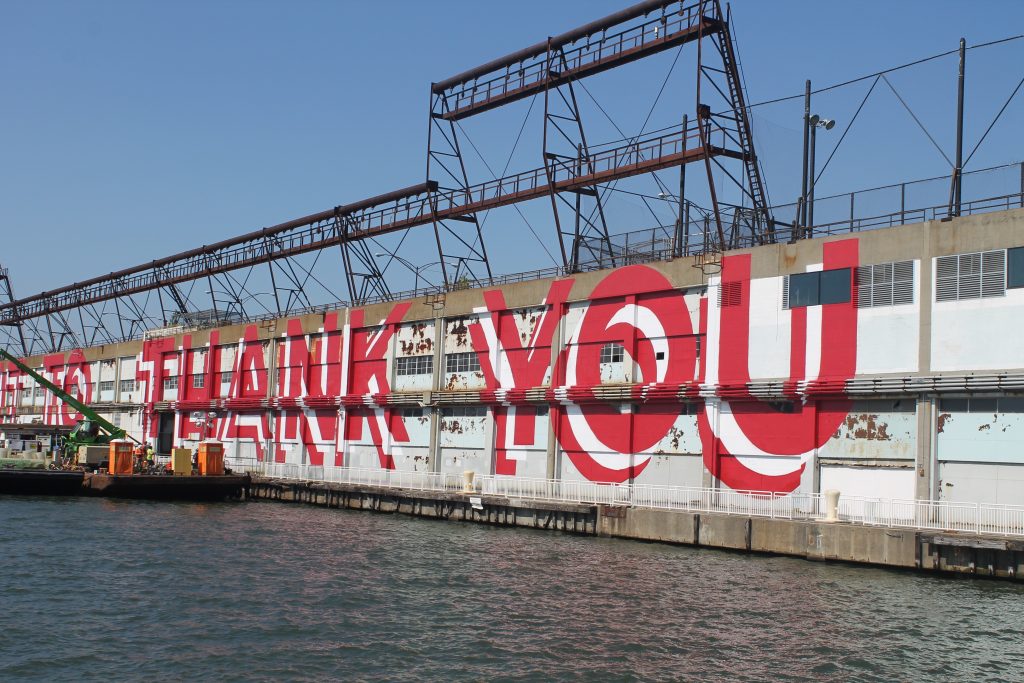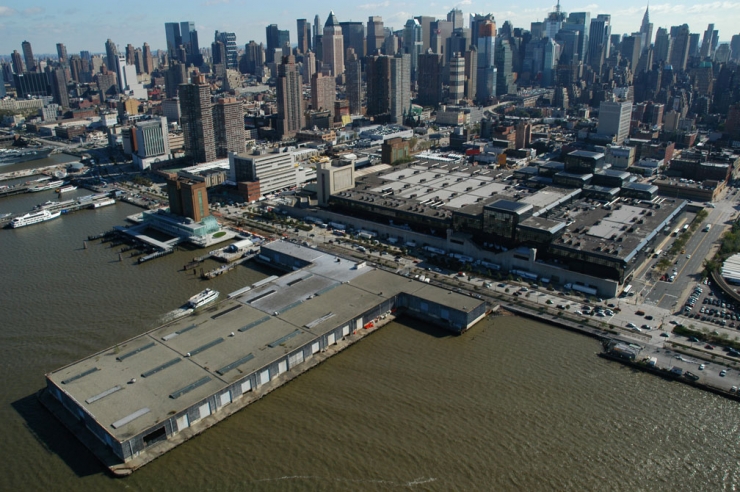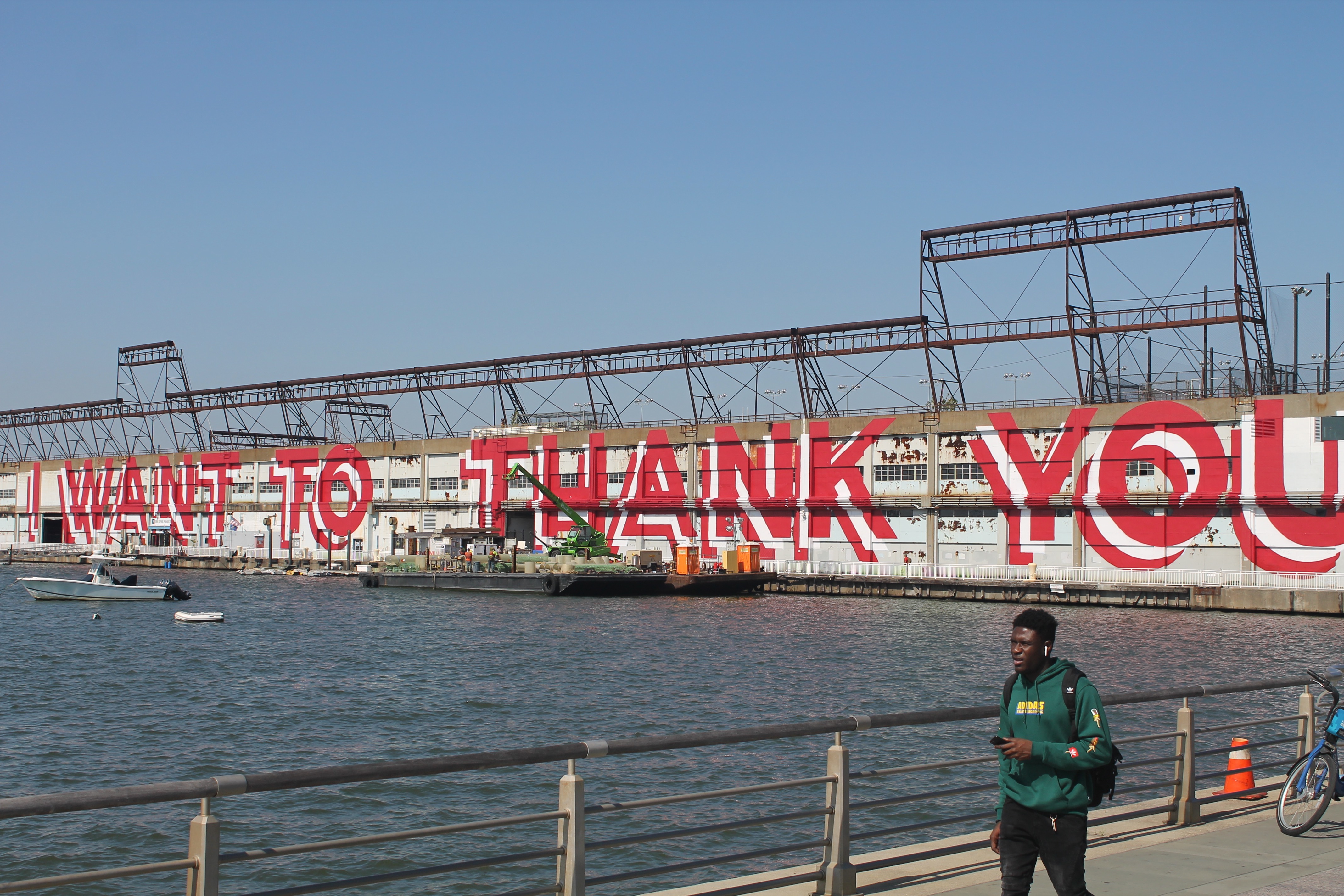BY LINCOLN ANDERSON | Updated Wed., Jan. 1, 11:30 p.m.: Leaving no doubt who’s the boss on Hudson River Park, Governor Andrew Cuomo on Tuesday rejected a bill that would have legalized a massive amount of commercial office use on Pier 40 and allowed buildings nearly 90 feet tall.
As first reported by The Village Sun on New Year’s Eve, Cuomo vetoed a legislative amendment to allow up to 800,000 square feet of office space on the Lower West Side pier at W. Houston St.
In turn, the governor instead shifted the focus to getting the Police Department tow pound off of Pier 76, at W. 36th St., declaring it’s time to “maximize the potential” of the “underutilized” Hell’s Kitchen pier.
Hell’s Kitchen residents recently filed suit to force the police to vacate Pier 76, which is supposed to be redeveloped as 50-percent park and 50-percent commercial space.
Cuomo had 10 days to sign a bill to legalize commercial office use on the gargantuan Pier 40, with the deadline for his decision being the last day of the year.
A Community Board 2 member forwarded to The Village Sun a legislative alert sent out at 4:38 p.m. on Tues., Dec. 31, announcing that Cuomo had rejected the bill.
The Hudson River Park Act of 1998 — the 4.5-mile-long waterfront park’s founding legislation — forbids commercial office use in the park. However, the park’s governing authority, the Hudson River Park Trust, with this latest bill, was pushing to legalize office use on the 15-acre pier, in order to generate millions more dollars of revenue. According to the Park Act, the park is supposed to be financially self-sustaining “to the extent practicable.”

Specifically, the legislation would have allowed up to 800,000 square feet of office space on the pier, with structures as high as 88 feet. One hundred thousand square feet of that space would have been for the Trust’s own offices and maintenance uses.
Cuomo explained his veto of the bill in a letter.
“Pier 40 is a valuable asset to the surrounding community, offering recreational space in an area of the city that is more and more congested, home to an increasing number of young families requiring recreation space,” he wrote. “The pier also is a rare asset in its proximity to the magnificent Hudson River.
“The justification for development is to provide additional money for the Hudson Park. Money is always the rationale to develop sites in Manhattan, hence the lack of open space, green areas, parks or recreation space. We have so few remaining parcels available for community use.
“For instance, there have been several attempts to move the tow pound currently used by the City of New York at Pier 76 to allow for additional development,” Cuomo said. “Indeed, the [Park] Act currently states that the City, once it has vacated the tow pound, will transfer the pier to the State for use as part of the Park. It is wholly underutilized and has tremendous potential and the site must be maximized. The one thing we are not making any more of in Manhattan is open space, and this must be protected.
“The State and City fund the Hudson River Park and will fund it again this year,” the governor pledged. “The issues outlined leave me no choice to veto the bills, and in the next session I will work on legislation that will ensure that the Park will finally have access to Pier 76, which will ensure Pier 40 reaches its full potential.”
By “next session,” Cuomo meant the current legislative session, which started Jan. 1 and runs through the end of June.

Tapping the commercial potential of Pier 76 would take the pressure off of Pier 40 to be a cash cow for Hudson River Park. The current parking operation at Pier 40 brings in about $7.5 million a year in revenue, a good share of the park’s operating budget. Community Board 2 members have protested that their Village stretch of the park already provides more than enough of the park’s money and shouldn’t be leaned on to give more. Pier 76, meanwhile, is in Community Board 4.
The state Legislature approved the Pier 40 bill in June, at the end of its last session, but the governor delayed in signing it. The Trust, however, had wanted even more office space on Pier 40, to the tune of an additional 200,000 square feet. But the bill’s primary sponsors — Assemblymember Deborah Glick and state Senator Brian Kavanagh — reportedly balked at the idea of an increase.
Village attorney Arthur Schwartz last week said he would sue if the bill was passed, on the grounds that a plan for an office building on Pier 40 would be required to go through a full environmental review. Schwartz said that Carl Heastie, the Assembly speaker, was saying that if the bill for 800,000 square feet of office space was not voted on this time around, it would not be taken up again by the Legislature until 2021.
According to a recent news report, the Trust, in turn, had consented to accept the bill as written.
“I applaud the governor, who has acted in the spirit of the park and especially Pier 40, as opposed to our local politicos who went along with this inappropriate plan,” Schwartz told The Village Sun. “The ballfields on Pier 40, now 21 years old , will continue as part of our community’s lifeblood, and development unrelated to the waterfront will be kept out of our park.”
Schwartz also claimed his lawsuit threat was the difference maker that pushed Cuomo to veto the plan.
“I’ll take credit,” he said, “no one else spoke out against it.”
Although she sponsored the bill, Glick told the New York Post she was “blown away” by Cuomo’s bold veto.
“It was music to my ears,” the assemblymember said. “I was pretty much blown away by how much the governor has listened over the last few weeks to what I and Community Board 2 have been saying.”
Asked for comment on Cuomo’s veto, a Trust spokesperson praised the governor’s “comprehensive solution” approach.
“The importance of Pier 40 for Hudson River Park’s overall financial health and as a recreational resource cannot be overstated,” the spokesperson said. “We appreciate that the governor is looking for a comprehensive solution for Pier 40 and the entire park.”

The law firm of Alterman & Boop is representing the Hell’s Kitchen Neighborhood Alliance on the Pier 76 lawsuit. Arlene Boop said the governor’s statement on Pier 76 was welcome new year’s news.
“This is a very public statement on Cuomo’s part,” she said. “This is one of my lawsuits that I would discontinue with a big smile on my face if the tow pound is gone. The fact that he’s doing it as publicly as he’s doing is terrific and gives me hope.”
But Boop said her clients are not about to drop their lawsuit, which would not happen “until I go and I look at that pier and there’s no tow pound.”
The city and the Police Department must give their response to the lawsuit by Jan. 16.
Longtime waterfront activist Tom Fox noted that Cuomo, when he salvaged Barry Diller’s Pier 55 project, had vowed to complete Hudson River Park if he won re-election in 2018.
“He has been consistent in his commitment made in the Pier 55 deal,” Fox said, “and I trust he will work hard toward the completion of the park by the end of his term, as he promised.”
Fox and co-plaintiffs from The City Club of New York sued to stop Diller’s project before reaching a settlement with Cuomo’s help.
Many advocates, as well as politicians, have called for scrapping the idea that the wildly successful park be financially self-sustaining, instead saying that government should kick in more funding. Many note that it was the park — which runs from Chambers St. to W. 59th St. — that sparked the boom of high-end residential development along the West Side waterfront and argue that this new prosperity should be tapped for the park.
Also on Dec. 31, Cuomo vetoed a bill calling for New York State to indemnify the Trust for any accidents or injuries occurring on the Hudson River bikeway. Although the bikeway is technically not part of the park, the Trust shares responsibility for its upkeep with the state Department of Transportation. Cuomo said this “bifurcation” of oversight and the indemnification issue need to be better analyzed.
Insurance is now an urgent issue for the Trust because it is facing multiple costly lawsuits over the Halloween 2017 attack in which an ISIS-inspired terrorist drove a rental truck onto the bikeway at W. Houston St. killing eight parkgoers.


Not one independent analysis has been been made public of the amount of development rights that the Hudson River Park Trust claims it has to sell, neither the City Planning Department, nor the City Council or the State Assembly or Senate. My own analysis shows that the existing pier has utilized its full permitted floor area. The Trust has already sold development rights to the St. John Terminal Project as well which may not exist.
Bravo and sincere thanks to our Governor. This is leadership for the public good at its best. Thanks to Dan and Arlene Boop, HKNA’s attorneys, and to Corey Johnson who over the years never lost sight of the need for more open space. The sooner the tow pound is gone the better!
Kathleen Treat, Chair
Hell’s Kitchen Neighborhood Association
As one of the attorneys who worked on Pier 40, the Heliport, Gansevoort and Pier 97 i applaud the Governor’s action and support 100% his keeping his promise to finish the Park. After 20 years it is about time to restore Pier 76 to parkland and also to create a commercial use that funds the Park. We don’t need 800,000Square feet on Pier 40.